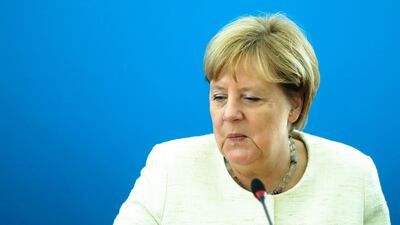Germany’s far-right Alternative for Germany (AfD) party has finished second in regional elections, making significant gains and in Saxony and Brandenburg and undercutting the authority of Chancellor Angela Merkel’s grand coalition.
Ms Merkel’s centrist alliance, known as the GroKo, has emerged from the elections intact but showing significant cracks following the two state elections in the east of the country.
In Saxony, which borders the Czech Republic and Poland, the anti-immigrant AfD won 27.5 per cent of the vote, nearly tripling the share it won in the last round of regional elections in 2014. At the same time in Bradneburg, the region that surrounds Berlin, the AfD won 23.5 per cent of the vote – nearly doubling their showing from five years ago.
Politicians from the governing parties have sought to put a positive spin on the results. In Saxony Ms Merkel’s centre-right Christian Democrats did finish first with 32 per cent of the vote but the victory masks an exodus of voters from the centre ground.
Similarly in Brandenburgh the Social Democratic Party (SPD), the GroKo’s junior partner, won 26.2 per cent of the vote.
A wipe-out had been predicted for the political centre in some quarters, leading some like Saxony CDU leader Holger Stahlknecht to praise the return of a “stable government” in the region.
Elsewhere, the warnings have been far starker. According to Germany's Rheinishche Post, the runner-up up in 2018's CDU leadership poll Friedrich Merz called the result "extremely worrying" and "a massive problem throughout Germany".
A former rival to Ms Merkel, he also said attempts to dismiss the regional results as a “black eye” for the centrist coalition had “fallen short”.
Elsewhere minority leaders have expressed their dismay at the gains made by AfD. The president of Germany’s Jewish council urged the mainstream parties not join forces with the right wing, while a leader within Germany’s sizeable Turkish Muslim community called the election results “frightening”.
Gokay Sofuoglu, chairman of the Turkish Community in Germany, said it had become clear that “racism in the new federal states had become a majority [opinion] again”.
Like a growing number of far-right, populist groups across Europe, the AfD has grown its support by advancing an anti-immigrant message. A series of high-profile criminal incidents involving migrants, often distorted in the press and on social media, has added fuel to the flames.
"The problem is really quite clearly linked to the migrant crisis, which has come into Germany" Raffaello Pantucci, director of International Security Studies at the Royal United Services Institute, told The National.
“While some of the stories that we saw around mass rapes in Cologne were in many cases vast exaggeration and untrue, they became linked in the public imagination to that immigration wave,” he said.
In 2015 Germany’s statistics office recorded the arrival of 2.14 million immigrants, the largest yet recorded arriving in country. The rise in arrivals, an increase of 36 per cent from the previous year, was was caused, partially, by refugees arriving from the war in Syria. More than 298,000 Syrians arrived in Germany in 2015.
During New Year’s Eve celebrations that year, hundreds of German women reported sexual assaults by men believed to be migrants, particularly in Cologne. In the aftermath, as those reports trickled down to the press, German attitudes hardened to migration and the cause was seized upon by the right to call for the closure of Germany’s borders.
Mr Pantucci said the gains made by the AfD had not translated into tangible political power and “should not be overstated”.
But, he did contend that the rise of the far right was of particular concern in Germany because of the country’s efforts to atone for its Nazi past. “It is fascinating to see how much Germans are taught and educated to reject this history,” Mr Pantucci said. “If Germany, the country that seemed so clearly to have rejected its past, is regressing to it in political form, that really is quite worrying,” he said.

